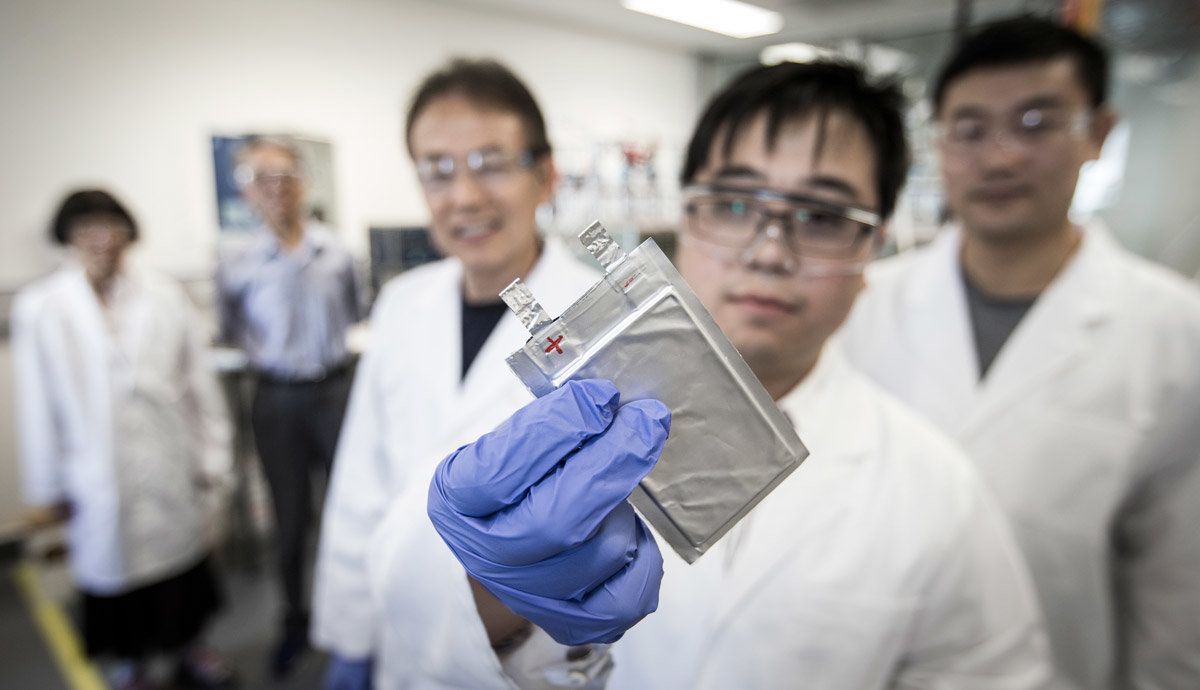Interested in the long-term investment opportunities that might arise from disruption? Then watch these five disruptive trends in the coming decade, says Morgan Stanley Disruptive Change Researcher Stan DeLaney.



A new sodium-ion battery chemistry that shows superior performance to existing state-of-the-art sodium-based batteries could be the catalyst to enabling mass-production of the emerging technology for large-scale energy storage, such as in applications including storing solar power for industrial sites.
Despite sodium’s appeal as a low-cost, abundant and environmentally friendly building block for energy storage, it is a relatively new entrant in the field of battery technology research and development.
A key issue for sodium-ion batteries is that many of the active materials used in their chemistry are sensitive to air—exposure to even a few molecules of air can degrade the material and reduce battery performance.

Researchers at the University of Notre Dame are developing a renewable energy approach for synthesizing ammonia, an essential component of fertilizers that support the world’s food production needs. The Haber-Bosch process developed in the early 1900s for producing ammonia relies on non-renewable fossil fuels and has limited applications for only large, centralized chemical plants.
The new process, published in Nature Catalysis, utilizes a plasma—an ionized gas—in combination with non-noble metal catalysts to generate ammonia at much milder conditions than is possible with Haber-Bosch. The energy in the plasma excites nitrogen molecules, one of the two components that go into making ammonia, allowing them to react more readily on the catalysts. Because the energy for the reaction comes from the plasma rather than high heat and intense pressure, the process can be carried out at small scale. This makes the new process well-suited for use with intermittent renewable energy sources and for distributed ammonia production.
“Plasmas have been considered by many as a way to make ammonia that is not dependent on fossil fuels and had the potential to be applied in a less centralized way,” said William Schneider, H. Clifford and Evelyn A. Brosey Professor of Engineering, affiliated member of ND Energy and co-author of the study. “The real challenge has been to find the right combination of plasma and catalyst. By combining molecular models with results in the laboratory, we were able to focus in on combinations that had never been considered before.”

Welcome to Oxford longevity related conference, free of charge.
Munjal Shah, CEO & Co-founder of Health IQ, discusses lowering premiums for better behavior.
Innovation series by Steven Loeb March 23, 2018 Short URL: http://vator.tv/n/4b46
New headset can listen to internal vocalisation and speak to the wearer while appearing silent to the outside world.
Fri 6 Apr 2018 08.15 EDT Last modified on Fri 6 Apr 2018 17.05 EDT.
Pretty Scientific is a new Gizmodo series where we explore how the best images in science were created and why.
Three pillars of gas and dust sit among stars like towers of billowing smoke. It would take several years for light to cross from the top to the bottom of these dusty columns. This striking image from the Hubble Space Telescope remains, to this day, one of the most well-known astronomical images ever taken.
But if you were to peer at the Pillars of Creation, part of the Eagle Nebula, through your own telescope, you wouldn’t see the same thing. The images you typically see of outer space are colorized and processed in order to bring out the detail and highlight the most relevant parts for scientific study. The popularity of the Pillars of Creation may have forever changed how astronomers present images of space to the public.

We are now a connected global community where many digital natives cannot remember a time before the iPhone. The rise of smart homes means that we are increasingly attaching our lighting, door locks, cameras, thermostats, and even toasters to our home networks. Managing our home automation through mobile apps or our voice illustrates how far we have evolved over the last few years.
However, in our quest for the cool and convenient, many have not stopped to consider their cybersecurity responsibilities. The device with the weakest security could allow hackers to exploit vulnerabilities on our network and access our home. But this is just the tip of the proverbial iceberg.
Businesses and even governments are starting to face up to the vulnerabilities of everything being online. Sophisticated and disruptive cyberattacks are continuing to increase in complexity and scale across multiple industries. Areas of our critical infrastructure such as energy, nuclear, water, aviation, and critical manufacturing have vulnerabilities that make them a target for cybercriminals and even a state-sponsored attack.

The plan to launch the module into space, and take reservations from customers for multimillion-dollar trips, was announced today at the Space 2.0 Summit in San Jose, Calif.
Orion Span says its hotel habitat, dubbed Aurora Station, will be about the size of a large private jet’s cabin, with 5,650 cubic feet of pressurized space. It’ll accommodate up to six residents at a time, including two professional crew members.
The flight plan calls for the module to be launched into a 200-mile-high orbit in late 2021, and host its first guests in 2022.

Virgin Galactic’s tourist-carrying spaceplane has taken a step closer to entering service after its chemical rocket engine was fired for the first time in the skies over the Sierra Nevada Mountains in California. With test pilots Mark “Forger” Stucky and Dave Mackay at the controls, the 60-ft-long (18 m) SpaceShipTwo VSS Unity pegged the speedometer at Mach 1.87 (1,424 mph, 2,290 km/h) within 30 seconds of igniting its engine.